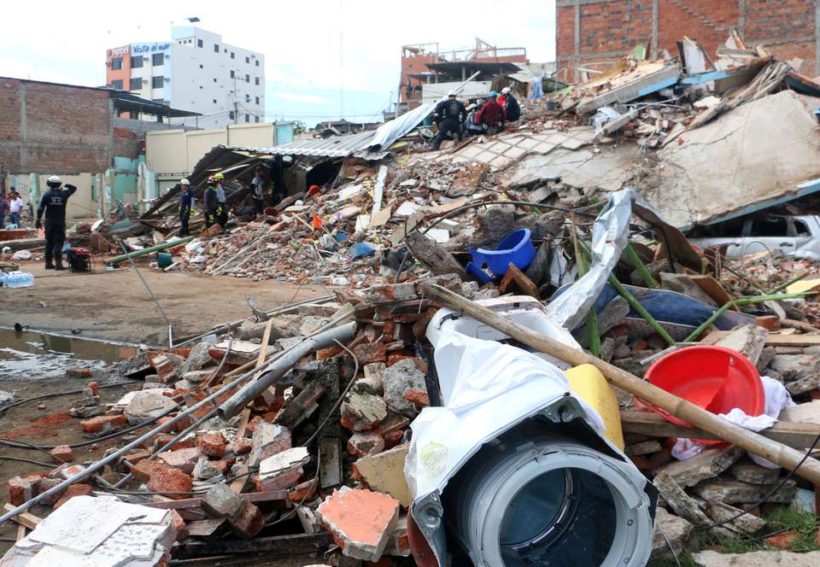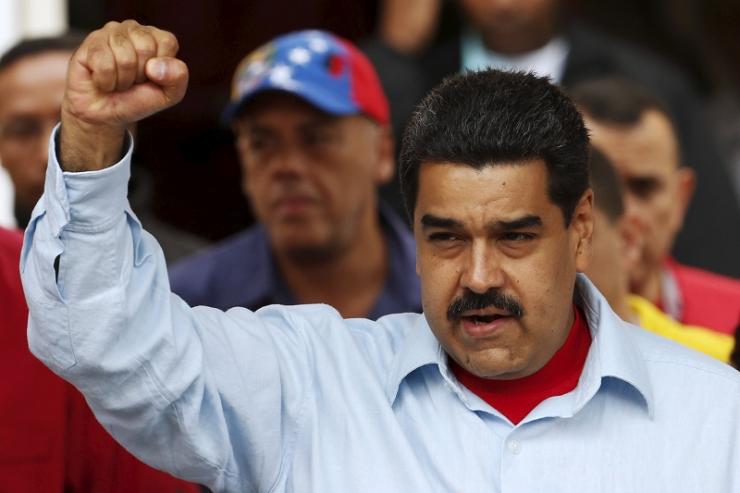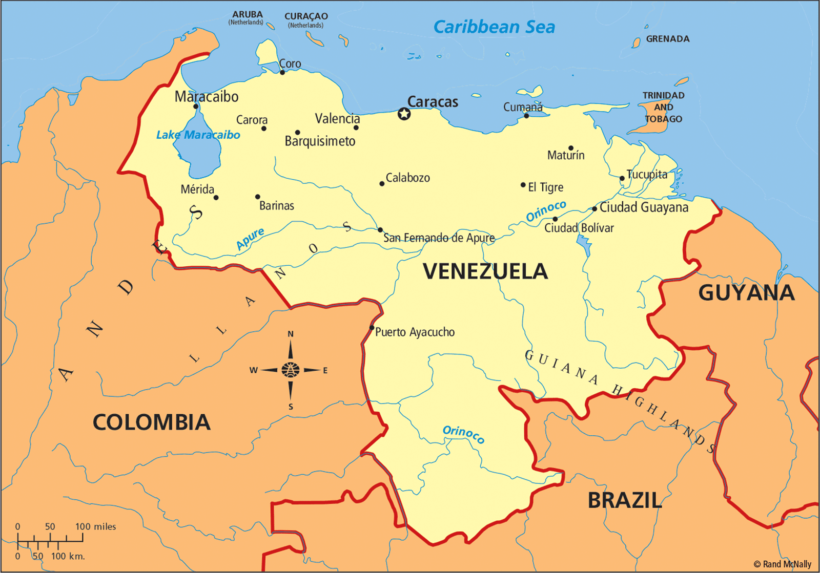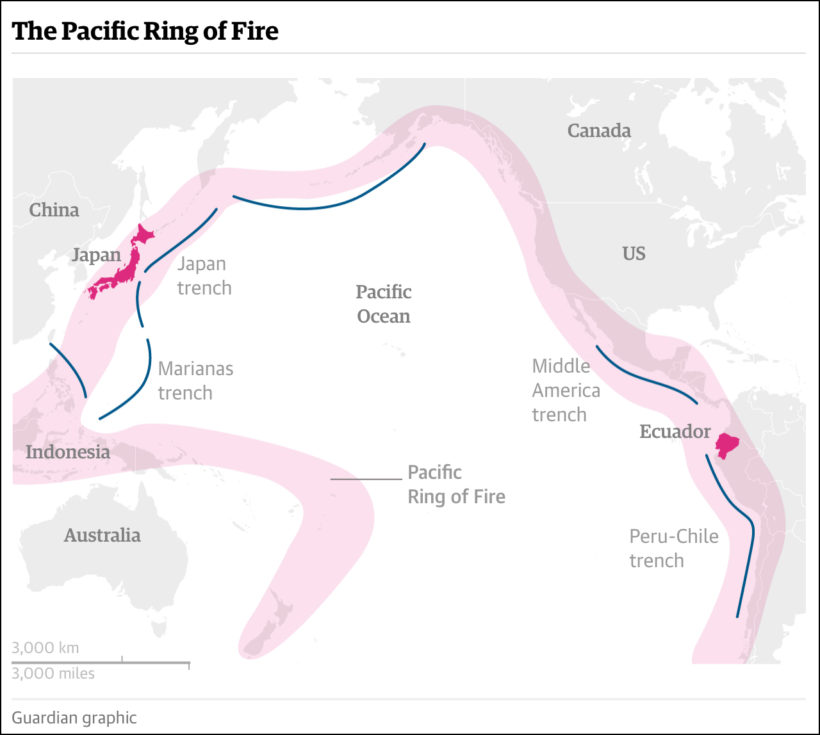
Pedernales, Ecuador, April 17 - Ecuador's biggest earthquake in decades (Reuters)
redo Jump to...
print Print...
ECUADOR – Ecuador earthquake death toll rises to 350 with many still trapped
(The Guardian, published April 18, 3:04 p.m. Eastern time) – The death toll from the 7.8-magnitude earthquake in Ecuador has risen to 350, and many survivors are believed to still be trapped inside collapsed buildings.
Ecuador’s security minister, César Navas, announced the updated toll and said rescuers were continuing to seek more victims and survivors.
More than 300 aftershocks have rattled Ecuador in the 36 hours since Saturday’s quake, some measured as high as magnitude 6.1, according to the country’s Geophysics Institute.

Speaking before the latest death toll was announced, Ecuador’s president, Rafael Correa, said an earlier figure of 272 would “surely rise, and in a considerable way.” Correa said citizens would pull together after the disaster. “The Ecuadorian spirit knows how to move forward, and will know how to overcome these very difficult moments,” he said.
More than 2,500 people were injured in the disaster, which brought down housing blocks and air control towers, buckled bridges and cracked pavements. In the coastal town of Chamanga, authorities estimated that more than 90% of homes had been damaged.
At least 100 of those killed in the quake were citizens of the regional capital Portoviejo. They included the Quinde family – a mother, father, teenage daughter and toddler son – killed when a four-story hotel collapsed on their car. The Quindes were en route to drop off Sayira, 17, for her first term at university, where she had won a scholarship to study medicine.
“I never thought my life would be destroyed in a minute,” her aunt Johana Estupiñan told Associated Press.
On the road to Portoviejo, a steady stream of ambulances transported the critically injured from the region toward hospitals in Guayaquil, which is 130 miles away and not as severely affected by the earthquake.
At a girls’ school in Playa Prieta, six members of staff including a Northern Irish nun were killed when the building collapsed. Sister Clare, 33, from Derry, was a nun in the Home of the Mother order. Her family said they believed she had been trying to lead colleagues out of the school to safety when a stairwell collapsed.
Warning of the continued risk of aftershocks, radio and television broadcasts recommended residents have a small backpack ready with water, canned tuna and a flashlight near the door of their homes.
The Spanish Red Cross said as many as 100,000 people may need assistance in holiday towns and fishing villages in the more remote regions near the epicenter of the quake, where citizens have been sleeping outside among the ruins.
The charity said it estimated that 3,000 to 5,000 people needed temporary housing. About 800 volunteers and staff members with the Ecuadorian Red Cross were involved with search and rescue operations and helping provide first aid.
Spain has sent a military plane with 47 search and rescue experts and their five dogs to Ecuador, and it is expected to arrive in the city of Guayaquil on Monday afternoon. Other rescue teams have flown in from Mexico and Colombia.
Local radio reported that two trucks filled with emergency supplies had been carjacked as they headed to the worst-affected areas.
GREAT BRITAIN – NHS reconsiders ‘self-check in’ after patients fake symptoms to jump queue
(London’s Daily Telegraph) – Britain’s National Health Service (NHS) system of self-check in kiosks for A&E (Accident and Emergency) patients is set to be overhauled after patients were found to be exaggerating symptoms in order to jump the queue. [The NHS (National Health Service) is the British Health Care system. Under this system, the British government runs the hospitals, and doctors, nurses and medical workers are employees of the government. Health care is free to all in this system. Wait time to see a doctor in many cases is notoriously long.]
The airport-style computer screening was introduced three years ago in a bid to ensure the most urgent cases were seen most quickly, and save staff time.
The idea was that those with more minor ailments could use a touch screen to tell doctors “how sick they were” by rating their pain on a scale of one to 10.
But now patients who may not be critically injured/sick have been found to be exaggerating their situation, to persuade doctors to treat them as an emergency case.
Hull And East Yorkshire Hospitals NHS trust*, which introduced the kiosks in two emergency units said the system would now be changed – so nurses can check that the most urgent cases are prioritized. [*An NHS trust generally serves either a geographical area or a specialized function (such as an ambulance service). In any particular location there may be several trusts involved in the different aspects of healthcare for a resident.]
Chief medical officer Kevin Phillips said: “People who are not that sick are entering details which make them look sicker.”
He said that in future, hospital workers would work with patients to ensure that symptoms were reported properly. “We are looking at putting in a better triage system, in with humans, which would make a big difference,” Mr Phillips said.
The trust is among many which is failing to hit A&E target to see 95 per cent of patients within four hours, and has failed to reach the target since November 2013. Latest figures show just 78 per cent of patients are being seen within the required period.
The self-check in booths were introduced in 2012 at Hull Royal Infirmary and Castle Hill Hospital in Cottingham. After basic questions about sex and age, patients go to triage – a filter stage of the screen where they asked to rate what level of pain they are feeling on a scale from one to ten.
The information from the kiosks is then transmitted to staff and used to prioritize who gets to see a nurse – or doctor, depending again on how the patient answers the questions.
The touch-screen technology enables patients to check and view their details on the system and gives them directions to clinics. It also advises them of the areas they should wait in to ensure they are called into their appointment at the appropriate time.
Other NHS trusts have used touch screen technology for patients attending outpatients’ appointments – who have already been referred their by doctors – but the scheme is the first attempt to use the devices in A&E units. …
Last month Britain’s most senior Accident & Emergency doctor said casualty departments are on the brink of collapse and hundreds of doctors should be drafted from other duties to avert an immediate crisis.
Dr. Cliff Mann said hospitals across the country were being overwhelmed by “unprecedented” levels of pressure and overcrowding amid desperate shortages of medics.
At several NHS trusts, more than half of A&E (Accident and Emergency) shifts for doctors have gone unfilled since a cap on spending on locum* doctors was introduced, the President of the College of Emergency Medicine said. [locum are doctors who fill in for other doctors who are sick or on vacation]
VENEZUELA – Venezuela decrees Fridays a holiday to ease energy crisis
(Reuters) – Venezuela’s socialist President Nicolas Maduro specified on April 7 that public sector (government) employees, with the exception of those in the food industry, would receive Fridays off until a drought stops hurting hydropower generation.

Venezuela’s socialist President Nicolas Maduro in Caracas, April 7, 2016. Maduro decreed Fridays a day off for government workers to ease energy crisis.
With the OPEC country reeling from a power crunch, President Nicolas Maduro said this week that Fridays would be considered holidays for the next 60 days.
The leftist government’s official gazette said the move applies to government workers and excludes the food sector.
Venezuela’s grave economic crisis already has food (grains, meat, dairy and vegetables) running short. Lines of hundreds sometimes snake around supermarkets, which are controlled by the government, so a four-day work week in that sector would likely have worsened the scarcity.
Still, Maduro’s measure has sparked ridicule from his political opponents, who say it will aggravate an acute recession and demonstrates he is not governing seriously.
“Just because Maduro doesn’t work Monday to Friday, Saturday or Sunday, doesn’t mean we Venezuelans are like that,” said opposition politician Maria Corina Machado. “What we want is to keep working, and for you, Maduro, to go.”
The opposition, which won control of the National Assembly in a December election, is pursuing a multi-pronged approach to remove Maduro from office this year.

Some public sector employees fretted the measure would throw off their routine without significantly saving energy in the country with the world’s largest oil reserves.
“This decree is illogical,” said Luis Miguel Lopez, who works for the opposition municipality of Chacao in capital Caracas. “People are going to be at home consuming energy all the same.”
Maduro’s rambling and sometimes expletive-laden late-night speeches, as well as his recent suggestion women cut down on use of hair dryers, has irked many Venezuelans struggling to make ends meet and desperate for a solution to the crisis.
Experts say stronger energy investment, maintenance and diversification would have better protected Venezuela from the El Niño- induced drought which is hitting much of the Andean region.
(The news briefs above are from wire reports and staff reports posted at the UK Guardian on April 18, London’s Daily Telegraph on April 14 and Reuters on April 7.)
Questions
1. For each of the 3 countries, give the following information:
- capital
- location/the countries that share its borders
- the religious breakdown of the population
- the type of government
- the chief of state (and head of government if different) If monarch or dictator, since what date has he/she ruled? – include name of heir apparent for monarch
- the population
Find the answers at the CIA World FactBook website. For each country, answers can be found under the “Geography” “People” and “Government” headings.
NOTE to students: Before answering the questions below, read the information under “Background.”
2. For ECUADOR:
a) list the who, what, where and when of the news item
b) From the “Background” below the questions, “The Ecuador earthquake began deeper underground than the recent Japan quake, which would have lessened the shaking on the ground.” Why then was there more destruction in Ecuador?
3. For GREAT BRITAIN:
a) list the who, what, where and when of the news item
b) What is the NHS?
c) Why did the NHS introduce the self check-in system for A&E (Accident and Emergency) patients? Why isn’t it effective?
d) The Telegraph reports:
-“The trust [governement-run medical corporation is one of many] failing to hit A&E target to see 95 per cent of patients within four hours, and has failed to reach the target since November 2013. Latest figures show just 78 per cent of patients are being seen within the required period.”
AND
-“But now patients who may not be critically injured/sick have been found to be exaggerating their situation, to persuade doctors to treat them as an emergency case. Chief medical officer Kevin Phillips said: ‘People who are not that sick are entering details which make them look sicker.’”
Wait times to see a doctor for many patients is notoriously slow in Britain’s free national healthcare system. (Much longer than wait times to see a doctor in the U.S. – with the exception of our federal government-run VA – medical facilities for our veterans).
Should the patients be blamed for trying to see a doctor in a more timely fashion? OR
Shouldn’t the patients just wait their turn, since it’s “free”?
Explain your answer.
e) President Obama and many Democrats would like to implement a national healthcare system for every American (“free” healthcare). The problem is, there are unintended consequences in such a system. Ask a parent: do you think the pros outweigh the cons for government-run healthcare for all? Please explain your answer.
4. For VENEZUELA:
a) list the who, what, where and when of the news item
b) What is significant about Venezuela’s oil supply?
c) What did Luis Miguel Lopez, a member of the opposition party, say about President Maduro’s decree?
d) Do you agree with Mr. Lopez? Explain your answer.
Background
ECUADOR – Timing of massive quakes around globe coincidence:
Powerful earthquakes in the past week have hit three countries — Ecuador, Japan and Myanmar — but seismic experts say the timing of the quakes in disparate parts of the globe is an unfortunate coincidence.
The coastal region of Ecuador was shaken by a massive magnitude-7.8 earthquake late Saturday, followed by more than 130 aftershocks, that killed more than 230 and injured 1,500, according to government officials.
Southwestern Japan felt two powerful earthquakes a little more than 24 hours apart, killing at least 41 people, with 11 others still missing Sunday. The two quakes struck Kumamoto prefecture on the island of Kyushu, a magnitude-6.2 late Thursday night, followed by a magnitude-7.0 earthquake early Saturday.
Those deadly earthquakes came after a magnitude-6.9 earthquake struck Wednesday in Myanmar, formerly known as Burma. That quake did not cause any reported deaths, but dozens of people were injured in neighboring Bangladesh.
“As far as we can tell, these earthquakes aren’t related,” said John Vidale, director of the Pacific Northwest Seismic Network at the University of Washington. “We’ve had plenty of much bigger earthquakes that still don’t trigger earthquakes far away. It’s fairly clear that it’s just a coincidence.”
Ecuador is one of the most highly seismic regions in the world, located on what is known as the Pacific Ocean’s active “Ring of Fire.”

David Rothery, a professor of planetary geosciences at The Open University, northeast of London, told the Associated Press that the total energy released by Saturday’s magnitude-7.8 quake in Ecuador was “probably about 20 times greater” than the magnitude-7.0 quake in Japan early Saturday.
The Ecuador earthquake began deeper underground than the recent Japan quake, which would have lessened the shaking on the ground. But Ecuador is experiencing a greater loss of life and greater damage to property than Japan because of its less-stringent construction codes.
Rothery added that “there is no causal relationship between the earthquakes in Ecuador and Japan.”
Since 1900, there have been seven magnitude-7.0 quakes within 155 miles of the epicenter of Saturday’s massive earthquake in Ecuador, according to the U.S. Geological Survey.
In January 1906, a magnitude-8.3 earthquake and tsunami killed as many as 1,500, according to the geological survey. The epicenter of Saturday’s earthquake was at the southern end of the rupture center of the 1906 event.
A March 1987 earthquake in the same region resulted in about 1,000 deaths, the survey said. (from an April 17 USA Today report)
GREAT BRITAIN:
The NHS (National Health Service) is the British Health Care system. Under this system, the British government runs the hospitals, and doctors, nurses and medical workers are employees of the government. Health care is free to all in this system. Wait time to see a doctor in many cases is notoriously slow. This is the type of system President Obama and the Democratic controlled congress are working toward eventually creating in the U.S. Many Americans are opposed to implementing a system where the government will take control of their health care.
Resources
Amateur footage shows shelves shaking violently in a supermarket in Quito, Ecuador, as a 7.8-magnitude earthquake hits the country’s central coast on Saturday. The quake is the strongest in decades to hit Ecuador. The epicentre was 27 km (16 miles) south-southeast of Muisne, in a sparsely populated area of fishing ports.
Watch the video:
Daily “Answers” emails are provided for Daily News Articles, Tuesday’s World Events and Friday’s News Quiz.



